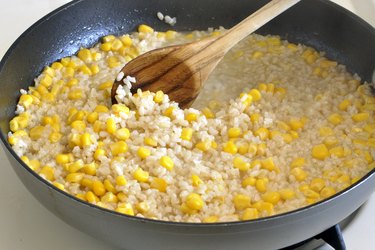
The materials of kitchen spoons, whisks and spatulas for stirring and flipping run the gamut from wooden to synthetic to metal. With a small array of such cooking tools -- some just for mixing, some for turning and some that cover both tasks -- your kitchen effectiveness increases while your frustration about not having the right tool for the job decreases. Keep an attractive utensil holder next to your stove so the right tools are always at hand.
Ubiquitous Wooden Spoons
Video of the Day
Professional chefs and home cooks love wooden spoons for mixing soft ingredients, such as sauces and cake batter, or stiffer ingredients, such as cookie dough. Wooden spoons are sturdy, naturally insulated against high heat and have a comfortable feel. Over time though, wooden spoons discolor and trap bacteria in small nicks and scratches; it's a good idea to replace your inexpensive, wooden spoons when they become worn.
Video of the Day
Metal and Synthetic Spoons
Although spoons made of metal or synthetics don't have the traditional look and feel of wooden spoons, they work for mixing in some cases. Like wooden spoons, plastic spoons don't scratch nonstick cookware and are insulated, but they're not as strong as wood and might release chemicals when you mix ingredients under high heat. Metal spoons transmit heat up to your hand and can possibly break glass mixing bowls -- they're useful for mixing salad ingredients in a wooden bowl. High-tech spoons, made with resin and fiberglass, are durable, dishwasher safe and heat resistant.
Whisks for Mixing
Whisks help you mix ingredients quickly and thoroughly. They also incorporate air into egg whites for meringue and into flour to make measuring more accurate, similar to the results from using a flour sifter. Small whisks work well when you make, for example, a vinaigrette salad dressing by incorporating the oil and vinegar, or a ketchup and mayonnaise dressing, smoothing out lumps in the mayonnaise. Use large whisks for mixing batters or cream pie fillings.
Plastic and Metal Spatulas
Spatulas work better than spoons for turning and flipping foods such as omelets and burgers because they give you a flat, firm surface to slide under the food. Metal spatulas typically have a slight flex to them, which helps you flip food, but unlike silicone or plastic spatulas, they scratch nonstick pans. Offset spatulas, which come in a variety of sizes, have an upturned edge so you can hold the utensil in an upright position as you slip it under one pork chop or pancake without disturbing the adjacent items.
Multipurpose Tongs
It's the rare utensil that does both turning and mixing well, but tongs, either metal or wooden, sometimes work. Flipping steaks or chops with tongs is straightforward -- simply grab the side of the meat with the tongs and turn it. To mix with tongs, repeatedly lift up some ingredients and drop them down, a technique that works best with pasta and vegetables.